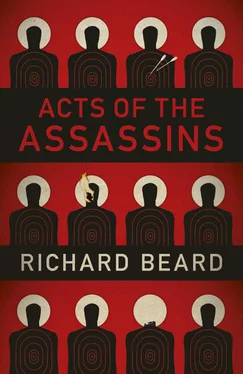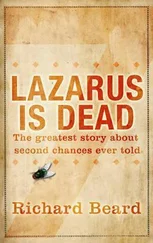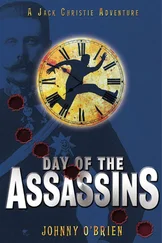The press are in attendance with their lenses and recorders. They film Cassius Gallio shaking hands with the local police commissioner, and shout out for a comment. Gallio grips the commissioner by the elbow and guides him across to the safer side of the police line, nearer the criminals than the press. He shows him two pictures of Jesus from a selection on his phone, a Rubens and a Tissot. The local policeman shakes his head.
‘Similar, but that’s not the man.’
Gallio swipes through the disciple images and stops at Simon. He has a photo of the sculpture he once saw in Brussels, Simon in white marble leaning on a two-handled saw. The commissioner studies the face.
‘That’s him, that’s the hostage.’
‘And the kidnapper?’
‘We don’t have a description. He’s armed. He has a knife.’
Gallio updates Claudia — the disciple Simon is the hostage — and suggests she makes Bartholomew safe. ‘That’s why we brought him, after all. We can’t trust anyone else. Find him a room, somewhere warm. And don’t let him out of your sight.’
A kidnap negotiator offers Gallio the loudhailer. He waves it away. He phones Baruch’s number, and after a lengthy re-routing via Israel and back to England, the phone rings and Baruch answers. Gallio has to shout, because the background noise sounds like a sawmill.
‘What’s going on? Never mind. Stop whatever you’re doing. I’m coming in.’
The uniformed police are impressed. A WPC in a stab vest, crouching and keeping her eye on the corrugated door, accompanies Gallio to the third garage along. Cassius Gallio walks upright, wishing he’d brought a hat, holding the phone to his ear. ‘Open the door wide enough for me to get in.’
Camera flash whitens the winter gloom. Baruch leaves the door as low as possible so the press can’t get pictures, and Gallio drops to a press-up position and slides in underneath. They’ll get front-page shots of a Speculator in action, a special agent’s fearless first contact with the hostage-taker.
Cassius Gallio pulls the door closed behind him and stands up inside the garage. Christ. He kills the phone. He doesn’t want to see what he’s seeing but this is what has happened in Caistor. The event can’t be undone. Simon is naked and hanging from chains, head-down, the weight of his shoulders slumped on a workbench.
Gallio holds vomit into his mouth with his hand. Christ. Christ alive, this will make Jesus pay attention, surely it will. Every act of evil is an appeal. An atrocity is a provocation, always has been: gods, if you exist and have any shame then show yourselves. When they choose not to show themselves — and according to modern historians this is usually their choice — the horror has failed to shame them. More horror is needed. What about this atrocity, and this? What about this act of evil now? Jesus, what about this here now? Baruch has accepted the challenge.
He has chained each of Simon’s ankles, and hauled him up by a pulley attached to a steel roof beam. Simon’s legs are spread and in the air, his exposed white vertebrae curled into the bench. Baruch has taken an electric chainsaw and split Simon from the groin, starting in the hinge between his legs. How could Jesus not come back at the sight of this? If not now, then when? Come Jesus if you’re coming, come on. Baruch is sawing your disciple Simon in half.
Civilisation cannot tolerate acts like this. It sends for the police and civilisation is the police. Civilisation intervenes, says with divine certainty that this must never happen, though it does happen. Cassius Gallio defies Jesus to explain Simon, and what he thinks the torture of Simon means. None of the recorded parables illuminate a fate such as this in a provincial English garage.
The garage has a brushed concrete floor, and on hooks in the breeze-block wall tools are ordered according to size. The fourteen-inch electric chain saw is missing from its outline next to a cordless hammer drill. The saw is plugged into an orange-flexed extension socket and has been used to slice through Simon as far as his lower stomach. There is a gallon of blood on the concrete floor, like an engine block emptied of oil.
Cassius Gallio’s mind turns away, saving itself, just as his eyes know never to stare at the sun. He couldn’t chainsaw a man in half, he thinks, but Baruch can. Gallio is a negotiator, a finder of the best way forward. He feels the pressure of conscience, of knowing that Simon shouldn’t have to suffer like this, and conscience feels suddenly like the presence of Jesus. Does it? Cassius Gallio could probably shoot someone with a gun. He’s no saint.
He doesn’t have a gun.
Simon is alive. Gallio sees his fingers twitch.
‘Bastard might as well die.’ Baruch sweats heavily into his white shirt, jacket off, buttons undone even though the garage is cold. He is exhausted, deflated. ‘I couldn’t break him.’
Baruch has moved beyond reasonable decision-making. If anything, reason contributes to the problem because lies are a reasoned attempt to mislead. Pain is necessary to destroy Simon’s ability to reason, and therefore to lie, and Simon has certainly felt pain. He should have told the truth about Jesus by now. Before now. A long time before.
‘He talked, but came out with the same old stuff. Jesus walking on water, and making blind men see. Jesus back from the dead, Jesus to come again.’
‘Baruch, what are you doing? What have you done here?’
Baruch starts crying, sobbing up huge gulps of grief. Gallio risks a glance at Simon. There, again, a flicker of movement right at the end of a fingertip.
‘I wanted to call Jesus out.’ Tears run down Baruch’s face, both cheeks, the corner of his mouth. ‘Paul managed it, so why can’t I? How can Jesus put up with this? He should be here, but he knows I won’t roll over like Paul. I could take him. I know I could, because he’s a coward. If he had anything about him I wouldn’t get away with this.’
And then he has no sobbing left inside him. He wipes his eyes, and anger returns as a reliable emotion, the one he knows and uses best. Anger rises and revives him, and with a new sense of purpose he puts down the saw. One more time he wipes the back of his hand over his eyes. He pulls out his knife.
‘Put down the knife, Baruch.’
Cassius Gallio is unarmed. He feels colossally stupid and arrogant for shutting the door of the garage. Baruch sniffs back the last of his tears then points the knife at Gallio’s throat, like an essential step in his reasoning.
‘I’ve been killing Simon for hours, trying to taunt Jesus out of hiding. I was expecting him to appear to me.’
‘Obviously it doesn’t work like that. Your analysis is flawed.’
‘I know how Jesus works.’
‘Do you? I thought Simon didn’t talk.’
‘Didn’t need to. He betrayed himself in the way he acted. The torture was necessary to find that out, but now I know their secret.’
Gallio is distracted by Simon’s fingers, watching them until they’re no longer closing, however faintly, as a sign that his brain is reaching for grains of life. Simon is breathing, hearing. Something outside himself is understood, and then it is not. His fingers are still. The soul goes out of Simon, and Cassius Gallio waits for a profound insight or thought. None comes.
The seventh disciple is dead, but Jesus stays away. He does not have a human heart.
‘Let me tell you what I did with the bones of James,’ Baruch says. ‘This is important. Not the last James, but the one they beat to death. The first James, the disciple my men beheaded in Jerusalem. I was pleased they did it. Didn’t bother me in the slightest, but I felt we had a point to prove with the body. I wasn’t going to risk a second Jesus, or Lazarus, so James had to stay dead. I boiled his corpse in a horse cauldron. Left it in there for hours, until the meat floated off. Beige in colour, I remember, like boiled pork. I chucked the meat to a dog. Other dogs turned up and fought for the scraps, no manners at all. I emptied the soup of James from the cauldron, watched it soak into the dried earth. The bones I collected into a sack, wrapped it in duct tape, and I personally signed off the package with UPS to Spain. It was the furthest place I could think of. James the disciple of Jesus was dead and he would not be coming back. That’s what I thought: this time when they die they’re dead.’
Читать дальше












